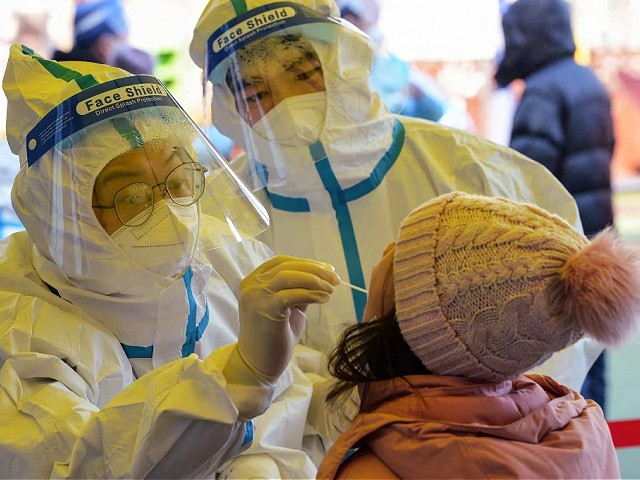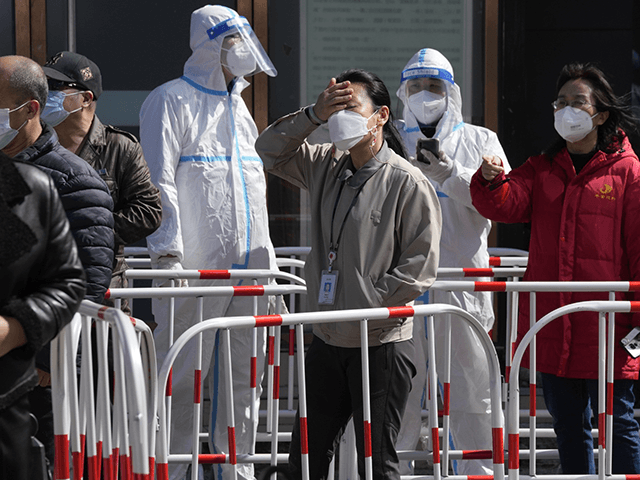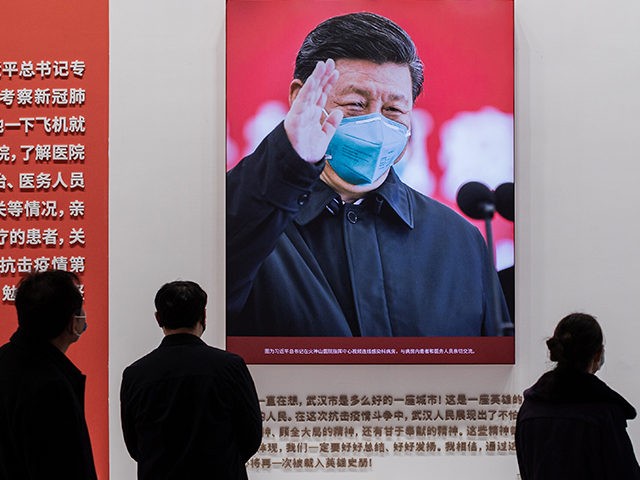Chinese officials on Wednesday admitted some “zero-Covid” lockdown policies have been “overly strict,” a very mild way of describing a policy that locked millions of people in their homes and seriously disrupted the national economy.
There was no sign that dictator Xi Jinping intends to loosen these policies or admit any mistakes on his part as a “twindemic” of Chinese coronavirus and influenza looms.
China’s state-run Global Times quoted the National Health Commission (NHC) admitting on a Wednesday conference call that zero-Covid might have gone a bit overboard, but then said, “multiple regions in the country have vowed in recent days to implement precise epidemic controls,” so Chinese citizens can only wait to discover if they will be trapped in another round of brutal lockdowns.

A resident undergoes a nucleic acid test for the Covid-19 coronavirus in north China’s Tianjin on January 10, 2022. (Photo by STR/AFP via Getty Images)
The NHC seemed acutely conscious of rising public discontent:
The NHC said on Wednesday at a meeting that epidemic prevention and control must proceed prudently and delicately, while stressing that China is unswervingly adhering to the dynamic zero-COVID strategy by preventing the import of cases and internal rebounds.
Amid the NHC’s call, multiple regions in China, including North China’s Inner Mongolia Autonomous Region, Central China’s Henan Province and Northwest China’s Gansu Province, have vowed to put more emphasis on precise epidemic prevention.
Henan provincial governor Wang Kai said on Monday that scaled outbreaks must be curbed as soon as possible. He emphasized that risk areas should be categorized scientifically and precisely, with key areas and personnel strictly controlled while other places would be properly relaxed.
“Precise epidemic prevention” appears to be the new Chinese Communist Party code phrase for reassuring the public that future restrictions and lockdowns will be less heavy-handed than the horror shows of the past year, in which entire cities were shuttered for weeks on end without adequate supplies of food and medicine.

Workers line up for COVID test outside an office building on Monday, March 14, 2022, in Beijing. (AP Photo/Ng Han Guan)
The Global Times strove to give its readers the impression that future control measures would be more reasonable and tailored to individual outbreaks, rather than the “oversimplified” or “one-size-fits-all” approach of the past. Loosened testing requirements at some major railroad stations and airports were touted as examples of the new, “precise” policies.
The Global Times hinted at another case of lockdowns contributing to severe injury and death, in this case a three-year-old child who died of carbon monoxide poisoning in the city of Lanzhou because coronavirus restrictions interfered with the paramedics’ response, as a reason why the NHC was worried about growing public unease.
Despite these promises to take a lighter touch, Chinese scientists told the World Flu Day 2022 symposium on Tuesday that the regime in Beijing still considers Chinese coronavirus a deadly threat, especially in concert with influenza, and believes the rest of the world has grown too lax about coronavirus prevention policies.

The railway police are on duty in the waiting room on April 7, 2020, in Wuhan, Hubei Province, China. (Stringer/Getty Images)
Chinese disease experts at the symposium touted China’s “landmark achievements in respiratory virus research” and recommended developing better detection and control strategies for both influenza and Chinese coronavirus, but they did not promote China’s lockdown policies.
Former Chinese Centers for Disease Control and Prevention director Gao Fu suggested aggressive public health measures to control the spread of Chinese coronavirus might have left many populations around the world with weak immunity to influenza, and now the worldwide easing of public health policies could allow serious flu outbreaks to occur.
Dictator Xi Jinping gave no indication of doubt or regret over his zero-Covid policies at the National Party Congress last month. On the contrary, he signaled those policies would not be loosened, and the “people’s war to stop the spread of the virus” would continue.

COMMENTS
Please let us know if you're having issues with commenting.